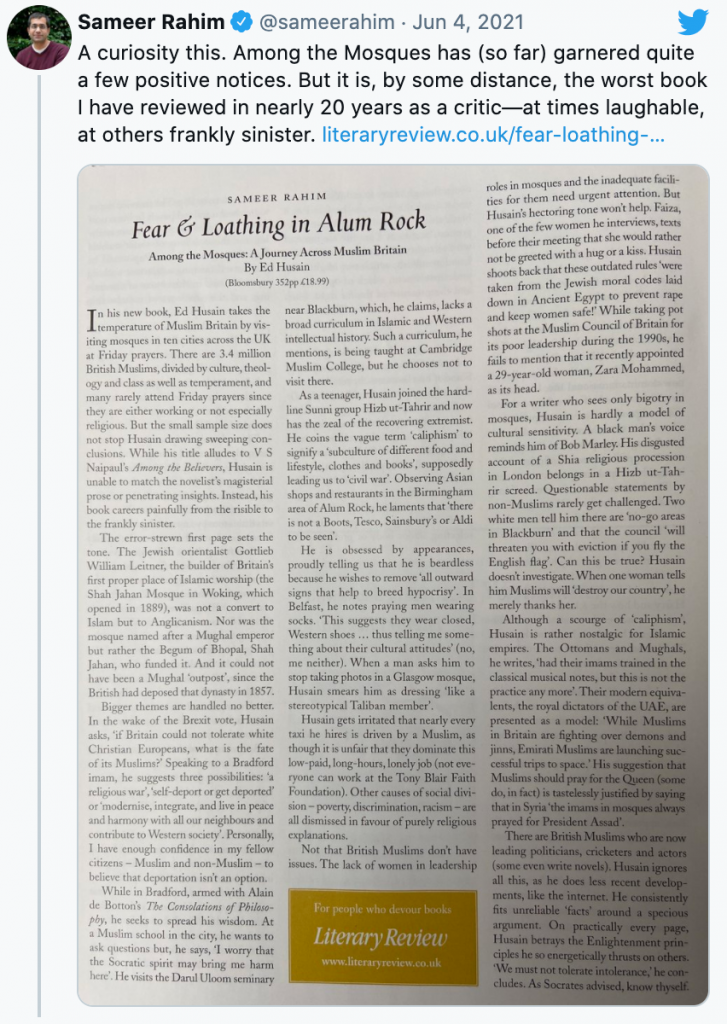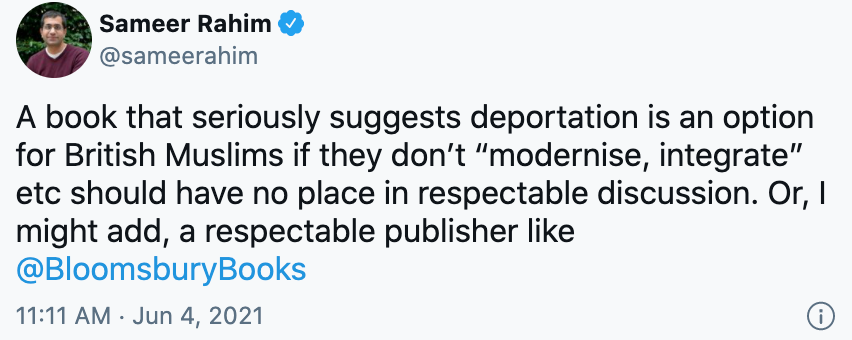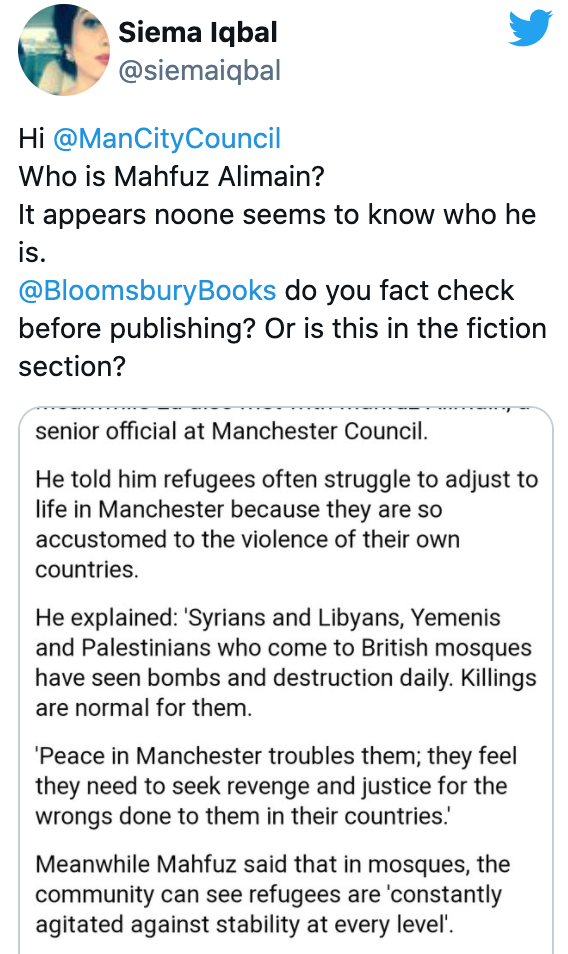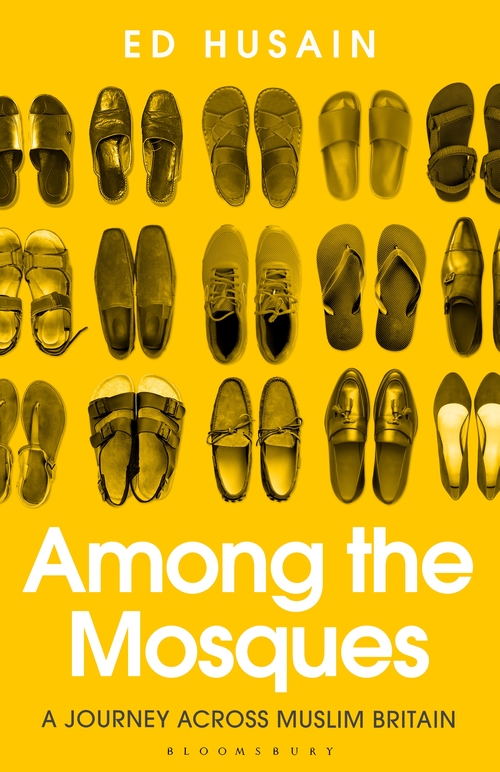On the 10th June 2021 Ed Husain’s released his latest book, titled “Among the Mosques: A Journey across Muslim Britain”. Despite being praised by the British media as “fascinating”1,”timely and important”2, doubts have been raised by local councils, academics and activists who argue that Husain’s work contains both factual inaccuracies and sweeping generalisations.
Among the Mosques: An Overview of the books purpose
For this book, Ed Husain visited ten cities and towns across the United Kingdom: Dewsbury, Manchester, Blackburn, Bradford, Birmingham, Cardiff, Belfast, Edinburgh, Glasgow, and London. Husain’s aim was to investigate what integration really looks like on the ground. As stated in his introduction to the book, Husain usually turned up:
“unannounced at the central mosque or at the largest weekly gathering: communal Friday prayers, to experience its sermon, its announcement and its conversations. I also visited mosques that are prominent for locals, even if they are not the ‘central mosque’. I stopped people in the streets. Wherever and whenever I had a question, I mostly asked” (Husain, 2021: 2).
Acknowledging that there are over 2,000 mosques in Britain’s towns and cities, the book focuses on two questions: “who is behind the proliferation of mosques?” and “what kind of mosques are they?” (Husain, 2021: 2). According to Husain, the problem is not the increase of the Muslim population in Britain, but rather what types of Islam is on the rise within British mosques themselves. This is problematic, Husain argues, because some communities are becoming increasingly cut off from Western life3.
The author Ed Husain himself is a Muslim, British writer and ex-advisor to former UK Prime Minister Tony Blair. Being a former member of the Islamist group Hizb ut-Tahrir, led Husain to co-found the now dissolved think-tank Quilliam to develop a strategy to counter Islamic extremism, which is mostly based on his personal experiences4.
Reviews and Responses
As mentioned above, the British press have positively received Husain’s book. Tabloid reviews such as the Economist and the Telegraph unvaveringly agree with Husain’s. The review in the Economist, for example, discusses the “darker story”5 of religion presented in the book, particularly how “Muslim communities are distancing themselves from wider British society and adopting stricter versions of their faith”6. In an attempt to evidence this claim, the review references the old mill towns of Yorkshire and Lancashire, which now “contain parallel societies” where there is no mixing and where “mosques run schools and pronounce on Islamic law”7. According to the Economist review, Husain, during his documented visits, found that mosques “taught a highly literal interpretation of Islam, sometimes clinging to argument that being dropped in the Middle East”8. They concluded their review by stating the need to cure societal divisions and that Husain’s book “makes a compelling case that that quest should not ignore the world of the mosque”9.
The Telegraph’s review and interview with Husain reached similar conclusions. In discussing the theme of segregation that runs through the book, the journalist focuses on recent events such as the Batley Grammar School Cartoon Incident as supporting evidence for Husain’s claims of divided communities. In this incident, which occurred in the UK at the end of March 2021, a teacher from Batley Grammar School in West Yorkshire was suspended following a religious studies lesson in which he showed cartoon depictions of the Prophet Muhammad. An external investigation has been launched following widespread rebuttal from Muslim organisations and protests from parents and the wider Muslim community.
In discussing this incident with The Telegraph, Husain responded that “we can’t let more Batleys emerge” and “we are losing the ties that bind us together”9. However, referencing the more “progressive and open mosques” that he visited in Belfast and Edinburgh, Husain also thinks that there is”hope” and it is for the Conservative party to “help save the country”10.
Backlash to the Book
Conversely, Muslim activists, communities and residents referenced in the book have expressed criticism n social media because of the generalisations and inaccuracies present throughout the book. For example the assertion that Glasgow and Edinburgh, the two largest cities in the country, are “no-go areas for white people” was met with dismay and rejected11.
Novelist and journalist Sameer Rahim gave the book a damning review, which he shared on twitter. He called the book “by some distance the worst book I have reviewed in 20 years”. Rahim moves to argue that the “error-strewn first page sets the tone” and further lambasts Husain for careering “painfully from the risible to the frankly sinister”.


The book chapter on Manchester has been especially criticised. Husain recounts that he met a man named “Mahfuz Alimain” that he presents as being a senior official in the Manchester City Council. In a specific excerpt that was published in the Daily Mail, Alimain when in conversation with Husain, stated that “refugees often struggle to adjust to life in Manchester because they are so accustomed to the violence in their own countries”12. The exert in the book moves on to quote Alimain as saying “peace in Manchester troubles them; they feel they need to seek revenge for the wrongs done to them in their countries“13. On the 9th of June, Manchester City Council declared that it had no knowledge of a Mahfuz Husain working for them, which raised further doubts about he factual evidence presented in Husain’s account. Doctor Siema Iqbal, a GP and co-founder of the Advancing Voices of Women Against Islamophobia organisation, tweeted directly to both the Manchester City Council and Bloomsbury (the books publishers). Here, she asked for further information on the aforementioned Aliman.

In another twitter thread, Dr Khadijah Elshayyal, Associate Fellow at the Alwaleed Centre of the University of Edinburgh, argued that “the ambiguity surrounding individuals he speaks to is only one of many alarm bells that jump out at any reader with a modicum for research ethics”14.
Husain responded to some of these criticisms on social media. Taking a direct stance against the Daily Mail’s “no-go areas” claim, Husain argued that the issues he addresses are much more complicated and nuanced and urged people to read the book and decide for themselves.
Sources
https://english.alaraby.co.uk/news/questions-raised-over-error-riddled-book-uk-muslim-life
http://www.euro-islam.info/2021/05/07/cartoon-controversy-in-uk-schools/
https://literaryreview.co.uk/fear-loathing-in-alum-rock
https://www.telegraph.co.uk/news/2021/06/06/multiculturalism-noble-aim-has-gone-wrong/






